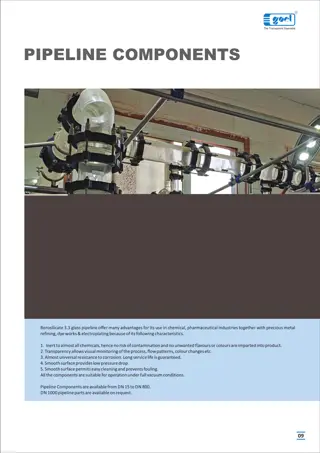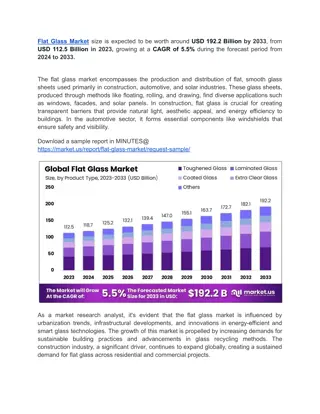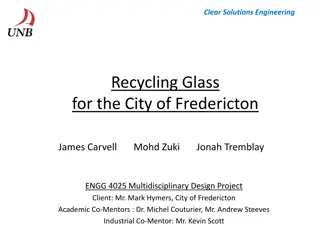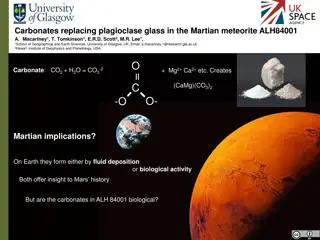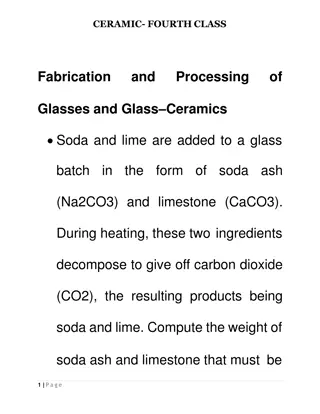Exploring Glass Technology: Components, Roles, and Structures
In the realm of glass technology, understanding the components, roles, and structures is crucial. From the composition of glass to the functions of former, flux, and modifier, delve into the world of classical glass theory. Explore the ternary phase diagram, flux materials like Na2O and CaO, and the key structural features of Pyrex glass. Unravel the complexities of glass formation, the impact of modifiers, and the significance of quenching rates on glass properties.
Download Presentation

Please find below an Image/Link to download the presentation.
The content on the website is provided AS IS for your information and personal use only. It may not be sold, licensed, or shared on other websites without obtaining consent from the author. Download presentation by click this link. If you encounter any issues during the download, it is possible that the publisher has removed the file from their server.
E N D
Presentation Transcript
http://i49.photobucket.com/albums/f284/rosabeme/curious-cat-28a.jpghttp://i49.photobucket.com/albums/f284/rosabeme/curious-cat-28a.jpg Ready to answer some questions, maggots ?
Match these terms and acronyms with the short descriptors listed below: DSC_____ modifier_____ SEM____ flux ____ XRD ____ Tg _____ anneal temperature___ poise____ c d e g h f b a a) units of viscosity b) glass transition temperature c) works out stress d)measures Tg e) diffraction lines & crystal structure f) breaks up former bonds g)re-connects islands h) 40,000X-100,000X magnifications
Glass Technology and Measurement drill and practice In classical glass theory, a glass is composed of three components. In order from most to least in %, what are they ? Former flux modifier Given the above component types, which type is SiO2 (sand) ? Former What role does flux play in glass making ? Breaks up extended former network so the glass will form isolated islands and melt at lower temperatures Give an example of a flux material.Na2O (soda) K2O (alkali oxides)
Glass Technology and Measurement drill and practice What role does the modifier play in glass making ? They re-join some of the isolated islands created by the flux and stiffen/strengthen the glass Give an example of a material that serves as a flux CaO (lime), MgO, BaO (alkaline earth oxides) Does it make sense that the most common (and oldest) commercial glass is called `soda lime glass ? Explain. Yes. Flux =15% w/w Na2O (soda) Modifier= 10% w/w CaO (lime) Former= 75% w/w sand
Glass Technology and Measurement drill and practice (cont.) Glass is non-thermodynamic, non-crystallographic and non-____________________ stoichiometric In the ternary phase diagram below, the increasing glass- forming regions defined by the dark curves is created by Increasing the rate of quenching the glass melt
Glass Technology and Measurement drill and practice (cont.) This 50,000X micrograph of Pyrex reveals what key structural feature of the glass ? Pyrex is biphasic (hard silica islands filled in with softer soda-silica-borate-CaO regions) Name and acronym for the instrument shown Scanning Electron Microscope (SEM) SEM s Typical magnification range ? 1000-40,000X
Glass Technology and Measurement drill and practice (cont.) Back-scattered electrons (BSE) Secondary electron emission (SE) X-ray energy dispersion (XRED) Name the SEM technique leading to each of these images
Glass Technology and Measurement drill and practice (cont.) Where is the SEM piece in the instrument below ? What s this piece do ? XRED unit (analyzes elemental composition at SEM focus pt) Vacuum coater to spray conductive Au or C onto non- conducting SEM samples What s this for ?
Glass Technology and Measurement drill and practice (cont.) What technique made the curve below ? Differential Scanning Calorimeter Q melting Dehydration (exo) Where does the DSC sample go in the DSC instrument shown to the right ? Tg stands for Glass transition T Tgcstands for Tmstands for Glass crystal transition T Melting point
Glass Technology and Measurement drill and practice (cont.) Find Tg, Tgc and Tm on the DSC curve below Tm Tg Tgc What s this instrument called ? X-ray-diffractometer (XRD) camera http://www.ounqpi.org/Websites/nanoscience/images/facilities/_full_0_Rigaku_X-Ray_powder_diffractometer_2.JPG source Point to where source, camera and sample are likely to be here Sample here
Glass Technology and Measurement drill and practice (cont.) Phase of sample ? crystalline Which XRD scan is created by a pure glass ?
If life is a bowl of cherries, why am I always in the pits ???







